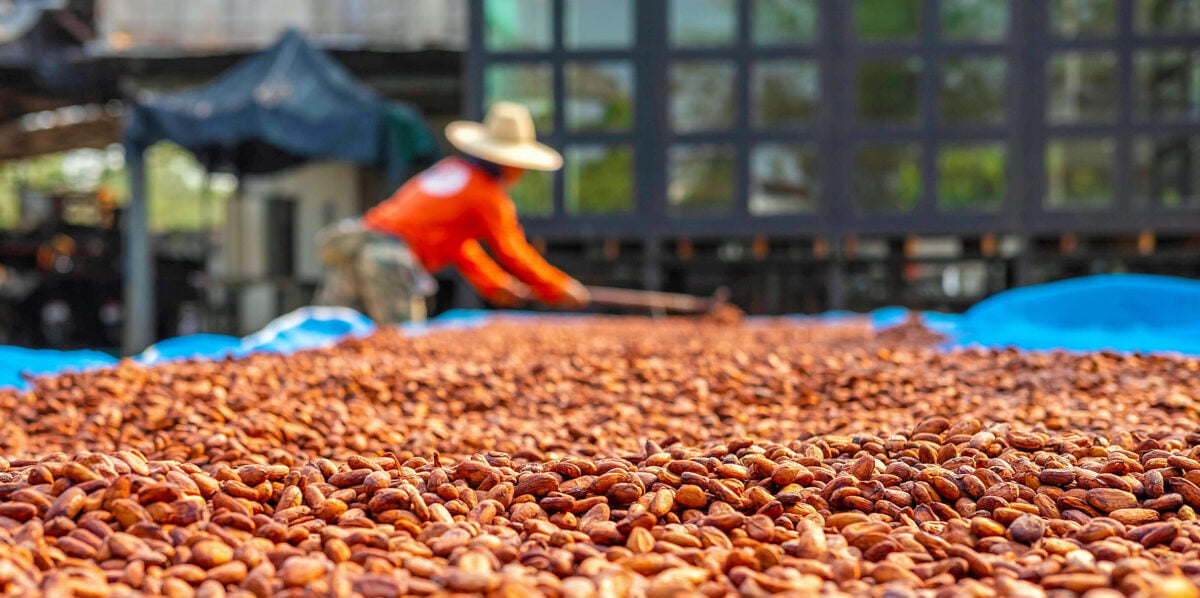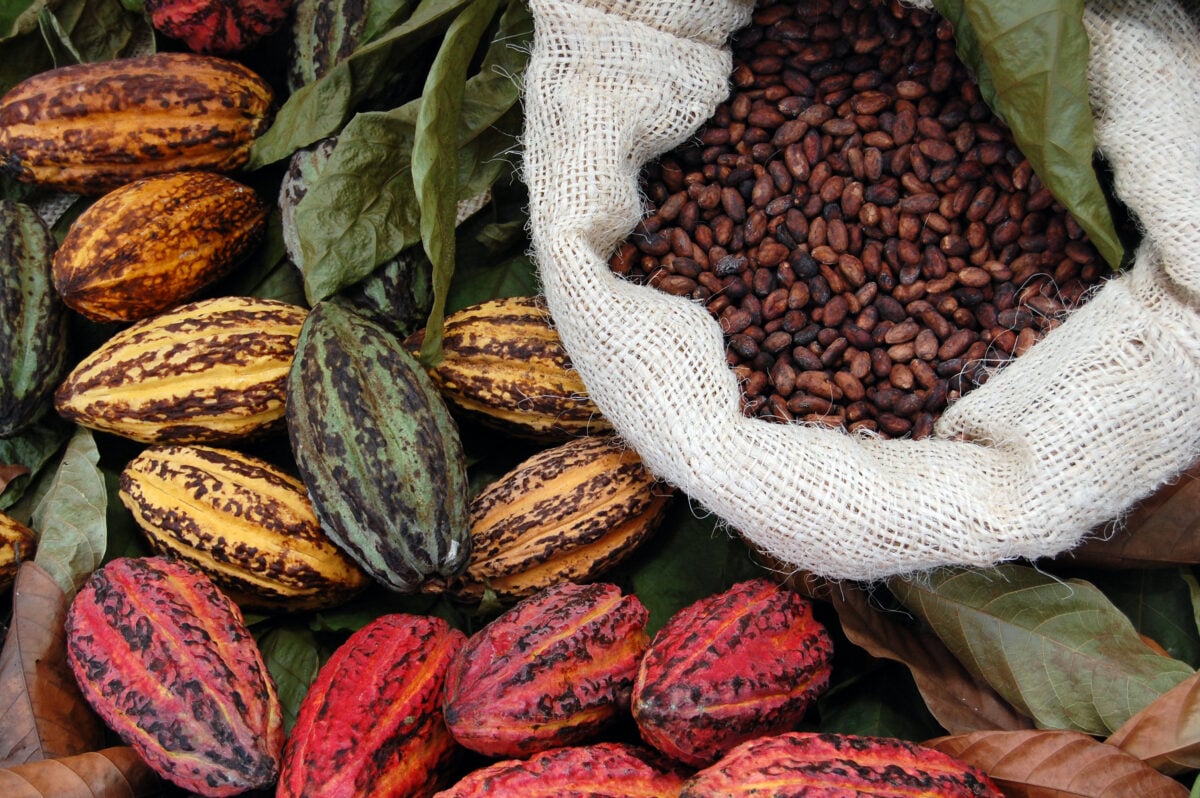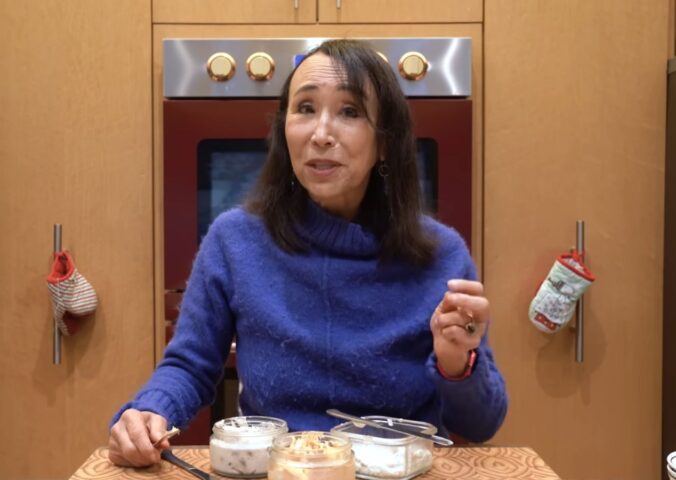For many of us, chocolate is the ultimate comfort food. Ninety-five percent of British people regularly eat chocolate, and 80 percent of the population indulges in it once or more every week. High-cocoa blends, in particular, are packed with antioxidants and nutrients like copper and iron, and eating chocolate may even improve your mood and boost brain function.
However, the ubiquitousness of chocolate belies an industry dependent on climate-vulnerable trees, opaque supply chains, and sometimes unsustainable production. In recent years, the industry has struggled to keep up with demand, leading experts to wonder if the world’s overwhelming desire for chocolate will be too much for producers to handle.
As a result, an increasing number of scientists and manufacturers have begun to research alternatives, while others look for new ways to minimize waste and maximize output within traditional cocoa production. But the industry’s hardships are multiplying, and the cost of cocoa is still increasing, so some experts are now wondering: will we run out of chocolate?
Here’s everything you need to know about the problems with cocoa, how people are working to save it, and whether a chocolate-free future is really on the horizon.
Read more: The ‘Best Dark Chocolate In The World’ Is Vegan
What’s happening to the cocoa industry?

The chocolate industry is a behemoth of manufacturing, processing, and distribution, and cocoa farmers grow approximately five million tons of beans per year. According to the WWF, cocoa production was worth US $138 billion in 2020 and is expected to grow to more than $200 billion by 2028, and more than $312 billion by the end of the decade.
Despite chocolate’s enduring popularity and the staggering value of cocoa production, the last few years have been a difficult time for the industry and for consumers. The sector was hit by a global cocoa crisis in June of 2024, and since then, prices have repeatedly reached record highs, peaking in January of this year. Throughout Western Europe, chocolate prices have risen by more than 50 percent due to these challenging market conditions.
West Africa’s “cocoa belt,” which reaches from Sierra Leone to southern Cameroon, produces approximately 70 percent of the global cocoa supply and is extremely vulnerable to the climate crisis. This cocoa belt has experienced a significant increase in extreme weather, with farmers attempting to maintain crops through flooding, drought, and excessive temperatures. All of these factors have contributed to a reduced yield and reduced quality.
The cocoa industry is not alone in experiencing weather-related obstacles, and farmers around the world are seeing more and more of the negative effects of global warming. However, West Africa’s cocoa farmers are perhaps uniquely vulnerable to these changes.
Read more: Scientists Discover More Sustainable ‘Healthy Chocolate’
Will we really run out of chocolate?

Experts predict that instances of extreme weather, environmental destruction, and global warming will continue to snowball, impacting cocoa production and making further price increases, shortages, and supply chain issues likely, particularly without intervention.
If no proactive steps are taken to improve the sustainability of the industry, total collapse remains a possibility. Even without the increasingly volatile growing conditions, cocoa production in its current form is rife with ethical, environmental, and humanitarian issues.
In many cases, underpaid growers pass cocoa into an opaque system of middlemen before it finally reaches chocolate manufacturers. This can make traceability all but impossible, much like the meat industry. As a direct result of this lack of traceability, the WWF reports that 70 percent of West Africa’s illegal deforestation is linked to cocoa production.
The murky nature of these global supply chains makes it easy for large companies to deny knowledge of environmental and human rights violations. It also makes taking decisive action to improve things, both for workers and the environment, difficult. Chocolate has long been linked to slavery, and in 2022, Mondelēz International, the owner of Cadbury’s and Oreos, faced allegations of employing child labor for cocoa harvesting, per the Guardian.
Overall, the combination of longstanding ethical and environmental issues within the cocoa supply chain – along with the increasing pressure of the climate crisis and growing global demand – means that the chocolate industry must adapt, and quickly, if it is to survive.
Read more: Company Launches Sustainable Cocoa-Free Chocolate
Sustainable alternatives to chocolate
Several companies are already working to streamline cocoa production, improve chocolate recipes, and create sustainable alternatives using novel processes and ingredients.
In August, Nestlé announced the creation of a new technique that uses up to 30 percent more of the cocoa fruit than traditional chocolate-making. The company’s technique incorporates historically unused parts of the fruit, including the pulp and placenta, to create “chocolate flakes,” as well as cocoa.
Nestlé’s technique features some similarities to a chocolate recipe published in Nature last year that incorporated a cocoa fruit jelly in place of sugar. The result was chocolate with reduced sugar content and increased fiber, as well as an overall reduction of wasted fruit.
Several companies have also created entirely cocoa-free recipes for sustainable chocolate, including carob-style alternatives like Betta Choc’s date seed and mycelium blend. According to Betta Choc, this recipe mimics both the taste of cocoa and its mood-boosting properties.
Fava beans, sunflower seeds, and cell-based chocolate
Last year, climate-tech startup Nukoko partnered with German ingredients manufacturer Döhler to scale a sustainable, cocoa-free chocolate. According to the companies, their alternative is made using proprietary fermentation and “robust” fava beans.
Other key players in the alternative chocolate space include California’s Voyage Foods, which is making grape and sunflower seed-based options, Switzerland’s Food Brewer, which is making AI-led cell-based chocolate, Denmark’s Endless Food Co., which upcycles brewers’ spent grain, and German brand ChoViva, made with sunflower seeds.
In terms of overhauling how cocoa is grown and distributed, techniques such as manual hand pollination may help bolster crops, while improved supply chain traceability, regulation, and certification could help to stamp out the various ethical and environmental issues.
In September, RaboResearch predicted a gradual easing of cocoa prices in the coming months, as reported by Food Ingredients First. However, chocolate prices will remain above pre-cocoa crisis levels, as factors like climate change continue to exert pressure.
Read more: King Charles Visits Luxury Vegan Chocolate Shop In Scotland






